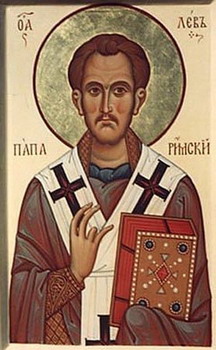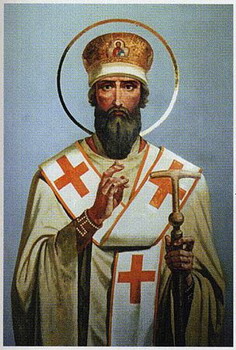|
|
Meatfare Saturday, Memorial Suturday Meatfare Saturday is one of several Memorial Saturdays, or Saturdays of the Departed, dedicated to remembrance of the dead in the liturgical year. Meatfare Saturday is one of several Memorial Saturdays, or Saturdays of the Departed, dedicated to remembrance of the dead in the liturgical year.St Leo the First, Pope of Rome Born in Italy of devout parents, he was first archdeacon with Pope Sixtus the Third, then elected against his own will to the papal throne after Sixtus's death. When Attila drew near to Rome with his Huns and prepared to ravage and bum the city, Leo went out to him in his episcopal vestments, tamed the wrath of the Hun leader and averted the fall of Rome. Attila was willing to be guided by Leo both because of his holiness and because of a vision he had of the Apostles Peter and Paul, standing behind Leo and threatening Attila with a flaming sword.
Leo not only saved Rome, he also contributed greatly to the safeguarding of Orthodoxy against the heresy of Eutyches and Dioscorus. This heresy consisted in the merging of the divine and human natures of Christ into one, and, following from this, the denial of the existence of two wills in the Person of our Lord and Saviour. This led to the summoning of the Fourth Ecumenical Council at Chalcedon, at which St Leo's Epistle was read - a letter which St Leo, after writing it, had placed on the tomb of St Peter, and which St Peter had corrected. As death drew near, he spent forty days in fasting and prayer by the tomb of the Apostle Peter, begging him to tell him if his sins were forgiven. The Apostle appeared to him and assured him that they were, except for his sins in the ordaining of priests (from which it is seen how grave a sin it is to ordain an unworthy man). The saint fell to prayer again, until he was told that these also were wiped out. Then he gave his soul to the Lord in peace. St Leo entered into rest in the year 461. Born in Italy of devout parents, he was first archdeacon with Pope Sixtus the Third, then elected against his own will to the papal throne after Sixtus's death. When Attila drew near to Rome with his Huns and prepared to ravage and bum the city, Leo went out to him in his episcopal vestments, tamed the wrath of the Hun leader and averted the fall of Rome. Attila was willing to be guided by Leo both because of his holiness and because of a vision he had of the Apostles Peter and Paul, standing behind Leo and threatening Attila with a flaming sword.
Leo not only saved Rome, he also contributed greatly to the safeguarding of Orthodoxy against the heresy of Eutyches and Dioscorus. This heresy consisted in the merging of the divine and human natures of Christ into one, and, following from this, the denial of the existence of two wills in the Person of our Lord and Saviour. This led to the summoning of the Fourth Ecumenical Council at Chalcedon, at which St Leo's Epistle was read - a letter which St Leo, after writing it, had placed on the tomb of St Peter, and which St Peter had corrected. As death drew near, he spent forty days in fasting and prayer by the tomb of the Apostle Peter, begging him to tell him if his sins were forgiven. The Apostle appeared to him and assured him that they were, except for his sins in the ordaining of priests (from which it is seen how grave a sin it is to ordain an unworthy man). The saint fell to prayer again, until he was told that these also were wiped out. Then he gave his soul to the Lord in peace. St Leo entered into rest in the year 461.St Flavian He was Patriarch of Constantinople after St Proclus, in 446, and was a contemporary of Pope Leo. He battled firmly against Eutyches and Dioscorus, but did not live to see the triumph of Orthodoxy at the Fourth Council, for, before that, he was so mercilessly thrashed and trampled on at a heretical council in Ephesus that he died there. He was a faithful soldier of Christ and a courageous defender and confessor of the Orthodox faith. He entered into rest in 449. He was Patriarch of Constantinople after St Proclus, in 446, and was a contemporary of Pope Leo. He battled firmly against Eutyches and Dioscorus, but did not live to see the triumph of Orthodoxy at the Fourth Council, for, before that, he was so mercilessly thrashed and trampled on at a heretical council in Ephesus that he died there. He was a faithful soldier of Christ and a courageous defender and confessor of the Orthodox faith. He entered into rest in 449. |